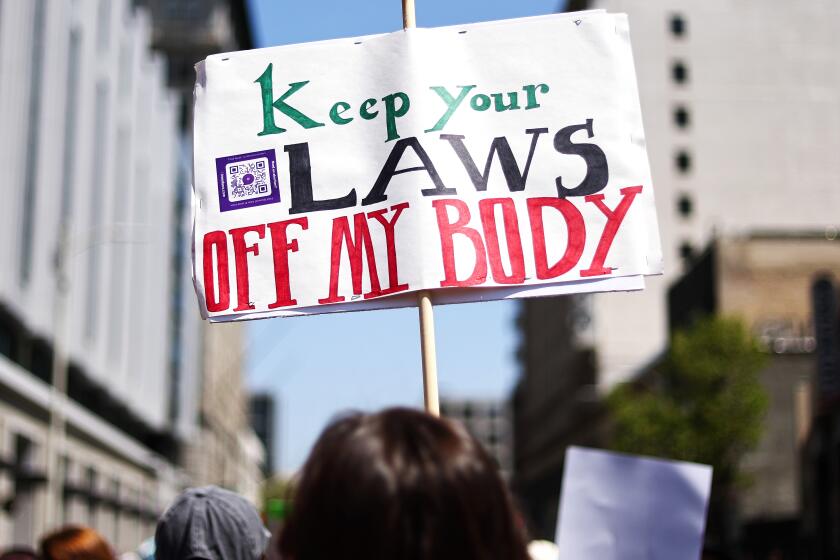Supreme Court Justice Samuel Alito has vast power and life tenure. So what’s his problem?

- Share via
In an indignant recent piece in the opinion pages of the Wall Street Journal, Supreme Court Justice Samuel A. Alito Jr. vehemently defended his right to receive a free luxury vacation and offered America yet another window into his disturbing worldview. The bizarre episode was just the latest example of Alito’s insistence on enjoying the country’s respect even when he fails to act respectably. As the court’s public standing plummets, Alito appears aggrieved that the public has the audacity to criticize him.
In the op-ed published Tuesday, Alito attempted to “prebut” a then-forthcoming ProPublica story detailing a lavish 2008 fishing trip he took as a guest of a hedge fund billionaire who has had a series of cases before the court. The billionaire, Paul Singer, flew the justice via private jet to Alaska, where they were hosted by yet another conservative megadonor at a fishing lodge.
Leonard Leo, a former leader of the Federalist Society and major force in the conservative legal movement, reportedly arranged the junket that allowed the justice to interact with moneyed interests with business before the court. And as the story noted, Alito did not recuse himself from cases involving Singer, at one point joining a majority decision in favor of the billionaire’s cause.
In keeping with standard journalistic practice, ProPublica submitted questions to the justice before the story was published. But rather than answer them, Alito opted to bitterly and preemptively complain about the story in an ideologically friendly outlet.
This is an extreme reaction from a public official — even one who is about to receive some negative but accurate press. Alito does not dispute that he flew on a private jet and enjoyed a luxury fishing vacation in Alaska free of charge. He does, however, maintain that his seat on the jet would have gone to waste if he had flown commercial, that the lodge was “rustic” rather than luxurious and that any wine he was served couldn’t possibly have cost $1,000 a bottle, as a member of Alito’s group reportedly bragged.
But Alito’s reaction is entirely consistent with the worldview he has revealed within and beyond his jurisprudence time and time again. Because even though Samuel Alito is a Supreme Court justice with lifetime tenure and all the power that position entails, he still wants more.
A year after the Supreme Court’s Dobbs decision, abortion foes want more, even if most Americans disagree.
The justice seems to believe that he and the court are so thoroughly supreme that they must be free of even a whiff of public criticism. Alito demands perpetual public and professional affirmation — a safe space, if you will, where he is protected from micro-aggressions, bathed in praise and consistently depicted as reasonable and judicious regardless of whether he actually is. And when his reception falls short of that, he lashes out at his critics no matter who they are.
Recall his remarkable performance back in 2010 at President Obama’s State of the Union address. After Obama criticized the court’s Citizens United decision striking down long-standing restrictions on campaign contributions, the television cameras panned over to the justices, who typically remain impassive at such political events. But not Alito: As his colleagues sat silently, the cameras caught him going rogue, conspicuously shaking his head and mouthing the words, “Not true.”
The criticism of that episode didn’t dim Alito’s ardor for insisting that other public officials must not question him. In a 2020 speech before the Federalist Society, he characterized an amicus brief filed by several U.S. senators as “bullying” the court.
The justice has also used his considerable platform to berate private citizens. In the same speech, he singled out a Harvard law professor who had written a blog post proclaiming that despite conservative domination of the federal courts, progressives had secured decisive victories on LGBTQ+ equality and other issues. Apparently triggered by the liberal scholar’s impudence, Alito fired back, warning ominously, “It’s not dark yet, but it’s getting there.”
In remarks delivered at the Notre Dame Law School in 2021, the justice decried an Atlantic article by journalist Adam Serwer as “false and inflammatory.” In fact, the article accurately described the court’s decision enforcing the notorious Texas law that effectively nullified Roe vs. Wade in one of the country’s largest and most populous states. In the same speech, the justice dismissed public and scholarly criticism of the justices’ increased use of the emergency or “shadow” docket as “unprecedented efforts to intimidate the court.” In another speech last year, he mocked several foreign leaders for daring to criticize his opinion overruling Roe.
And in another Wall Street Journal piece styled as an “interview” earlier this year, the justice whined that the court was “being hammered daily” and that “nobody, practically nobody, is defending us.”
A bipartisan bill would require a code of conduct for justices and create a process for complaints against justices to be filed and investigated.
It takes real cheek for a member of the Supreme Court to insist that he and the institution he serves are entitled to the public’s good opinion even in the face of indefensible behavior and decisions. And Alito is not just any public official demanding praise. He is one tasked with making rules that govern the entire country, not just those who agree with him.
And yet this man who has penned fiery dissents in decisions securing equal rights for LGBTQ+ people and other minority groups is so thin-skinned that he can’t brook a hint of dissent directed at him. The man who represents an institution charged with interpreting the 1st Amendment can’t bear others exercising their free speech rights to criticize him. Instead, he uses his stature and appearances to take potshots at those bold enough to question an institution that, as we keep learning, is loath to observe rules or restrictions.
The conservative legal movement long defined itself in opposition to liberal judicial “imperialism.” And yet it is Justice Alito, a prominent face of that project, who insists on the prerogatives of an emperor-king, among them unstinting general adulation and complete insulation from critique. It’s no wonder the court’s public standing is in trouble: Some of the justices seem to be letting the term “supreme” go to their heads.
Leah Litman is a professor of law at the University of Michigan Law School. Melissa Murray is a professor of law at the New York University School of Law. They are co-hosts of the “Strict Scrutiny” podcast.
More to Read
A cure for the common opinion
Get thought-provoking perspectives with our weekly newsletter.
You may occasionally receive promotional content from the Los Angeles Times.











